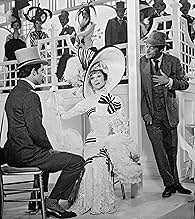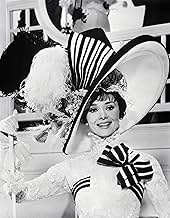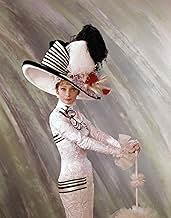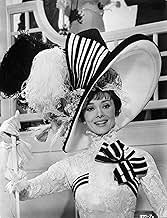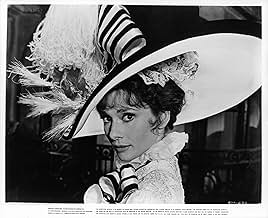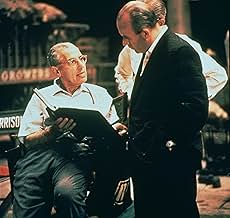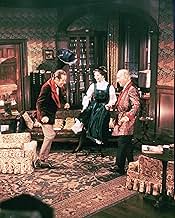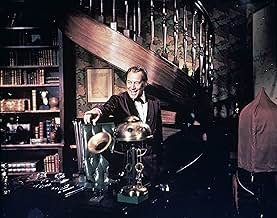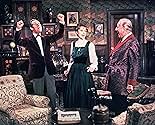En el Londres de 1910, el esnob profesor de fonética Henry Higgins acepta la apuesta de que puede hacer que la vulgar florista Eliza Doolittle esté presentable en la alta sociedad.En el Londres de 1910, el esnob profesor de fonética Henry Higgins acepta la apuesta de que puede hacer que la vulgar florista Eliza Doolittle esté presentable en la alta sociedad.En el Londres de 1910, el esnob profesor de fonética Henry Higgins acepta la apuesta de que puede hacer que la vulgar florista Eliza Doolittle esté presentable en la alta sociedad.
- Ganó 8 premios Óscar
- 26 premios y 13 nominaciones en total
Elizabeth Aimers
- Cockney
- (sin acreditar)
Helen Albrecht
- Ascot Extra
- (sin acreditar)
John Alderson
- Jamie - Doolittle's crony
- (sin acreditar)
Mary Alexander
- Cockney
- (sin acreditar)
Gertrude Astor
- Cockney
- (sin acreditar)
LaWana Backer
- Ad Lib at Church
- (sin acreditar)
Walter Bacon
- Ball Guest
- (sin acreditar)
Best Picture Winners by Year
Best Picture Winners by Year
See the complete list of Best Picture winners. For fun, use the "sort order" function to rank by IMDb rating and other criteria.
Argumento
¿Sabías que...?
- CuriosidadesCostume designer Cecil Beaton created 1,500 costumes for this movie, with the exception of the pearl white gown Hepburn wears to the Embassy Ball, an original Edwardian specimen Beaton found in an antique shop.
- PifiasWhen Prof. Higgins sings "An Ordinary Man" he turns on several phonographs, seconds later he turns off one of them but all of the sounds stop.
- Citas
Eliza Doolittle: The difference between a lady and a flower girl is not how she behaves, but how she is treated.
- Créditos adicionalesIn the posters, playbills and the original cast album for the stage version of "My Fair Lady", the credits always read "based on Bernard Shaw's 'Pygmalion' ", letting the audience know what play "My Fair Lady" was actually adapted from. The movie credits simply read "from a play by Bernard Shaw".
- Versiones alternativasIn the remastered version of the film, some of the scene changes are changed from sudden cuts to wipe outs, as they probably were when the film was released. When CBS Fox released it on video originally, they were changed to sudden cuts.
- ConexionesFeatured in Toast of the Town: Episodio #18.17 (1965)
- Banda sonoraWhy Can't the English?
(1956) (uncredited)
Music by Frederick Loewe
Lyrics by Alan Jay Lerner
Performed by Rex Harrison, Wilfrid Hyde-White, and Audrey Hepburn
Reseña destacada
I don't know how much I can add to this. The musical stands alone, as far as I'm concerned, so it puts a lot of pressure on the director, George Cukor, one of the greatest, to complement it. This is a lot to ask. I love this movie. I never got a chance to see the Broadway cast (I was four when it opened), but I have never been disappointed. The production numbers are grand, the byplay between the smug, offensive Higgins and Eliza is precious (my favorite song is "Just You Wait, Henry Higgins"). I've always been intrigued how Freddy never even has a chance (I can't watch those wonderful Sherlock Holmes episodes without imagining the grim visage of Jeremy Brett singing "On the Street Where You Live."). The one thing that made an impression on me, though some may see it as a criticism, is how "clean" everything is. There is no doubt in my mind that Cukor was elevating not only the dialogue but the visual images. It's probably not fair to like a movie because you like looking at an actress, but Audrey Hepburn glows in her Eliza, and I don't care if she is or was a street girl, she is the magical rose on the landscape before she ever meets Higgins. The business about who sings the songs is of no significance to me. This is a movie, not the Broadway show, so the images and sounds are melded and presented. Knowing that Audrey Hepburn has a beautiful voice makes it moot as well. I don't know if she could carry the picture or not--maybe not, but it doesn't concern me. When I first saw Stanley Holloway, there was something about him that grated on me (too many performances on the Ed Sullivan Show). He grated on me as Eliza's father. Now, every time I see this film, I thoroughly enjoy him and I really like the comedic qualities of his song. I love how he and his cronies cavort around London with total disregard for their base roots. I could go on, but I really like this film because it is filled with class: George Bernard Shaw filtered through George Cukor. Not bad!
- Hitchcoc
- 20 sept 2001
- Enlace permanente
Selecciones populares
Inicia sesión para calificar y añadir a tu lista para recibir recomendaciones personalizadas
Detalles
- Fecha de lanzamiento
- País de origen
- Sitio oficial
- Idioma
- Títulos en diferentes países
- Mi bella dama
- Localizaciones del rodaje
- Empresa productora
- Ver más compañías en los créditos en IMDbPro
Taquilla
- Presupuesto
- 17.000.000 US$ (estimación)
- Recaudación en Estados Unidos y Canadá
- 72.560.711 US$
- Fin de semana de estreno en EE. UU. y Canadá
- 354.764 US$
- 17 feb 2019
- Recaudación en todo el mundo
- 72.684.726 US$
- Duración2 horas 50 minutos
- Color
- Mezcla de sonido
- Relación de aspecto
- 2.20 : 1
Contribuir a esta página
Sugerir un cambio o añadir el contenido que falta

Principal laguna de datos
By what name was My Fair Lady (Mi bella dama) (1964) officially released in India in Hindi?
Responde






